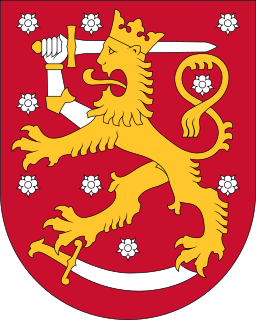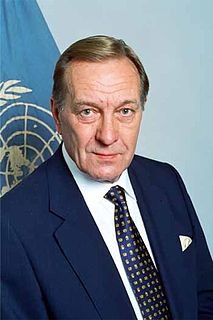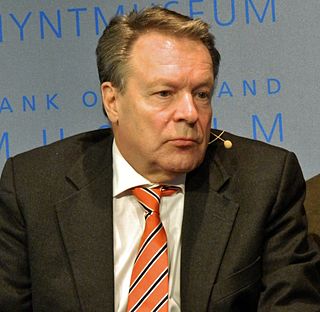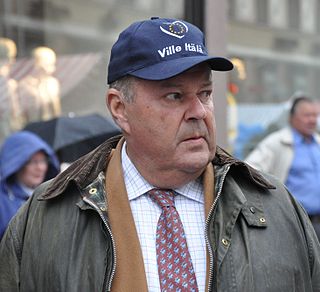
The politics of Finland take place within the framework of a parliamentary representative democracy. Finland is a republic whose head of state is President Sauli Niinistö, who leads the nation's foreign policy and is the supreme commander of the Finnish Defence Forces. Finland's head of government is Prime Minister Sanna Marin, who leads the nation's executive branch, called the Finnish Government. Legislative power is vested in the Parliament of Finland, and the Government has limited rights to amend or extend legislation. Because the Constitution of Finland vests power to both the President and Government, the President has veto power over parliamentary decisions, although this power can be overruled by a majority vote in the Parliament.

The prime minister of Australia is the head of government of Australia. The prime minister is the leader of the executive branch of the federal government of Australia and is also accountable to federal parliament under the principles of responsible government. The incumbent prime minister is Scott Morrison, who took office in August 2018 as leader of the Liberal Party.

The Christian Democratic Appeal is a Christian-democratic political party in the Netherlands. It was originally formed in 1977 from a confederation of the Catholic People's Party, the Anti-Revolutionary Party and the Christian Historical Union; it has participated in all but three cabinets since it became a unitary party.

Harri Hermanni Holkeri was a Finnish statesman representing the National Coalition Party of Finland. He was the Prime Minister of Finland 1987–1991, president of the UN General Assembly 2000–2001 and headed the United Nations Interim Administration Mission in Kosovo from 2003 to 2004.
The National Coalition Party is a liberal-conservative political party in Finland.

Toijala is a former town and municipality of Finland, located some 40 kilometres south of Tampere. On 1 January 2007, it was consolidated with Viiala to form the town of Akaa.
A minority government, minority cabinet, minority administration, or a minority parliament is a government and cabinet formed in a parliamentary system when a political party or coalition of parties does not have a majority of overall seats in the legislature. It is sworn into office, with or without the formal support of other parties, enabling a government to be formed. Under such a government, legislation can only be passed with the support or consent of enough other members of the legislature to provide a majority, encouraging multi-partisanship. In bicameral legislatures, the term relates to the situation in the chamber whose confidence is considered most crucial to the continuance in office of the government.

The prime minister of Estonia is the head of government of the Republic of Estonia. The prime minister is nominated by the president after appropriate consultations with the parliamentary factions and confirmed by the Parliament. In case of disagreement, the Parliament can reject the president's nomination and choose their own candidate. In practice, since the prime minister must maintain the confidence of Parliament in order to remain in office, they are usually the leader of the senior partner in the governing coalition. The current prime minister is Kaja Kallas of the Reform Party. She took the office on 26 January 2021 following the resignation of Jüri Ratas.

The politics of Australia take place within the framework of a federal parliamentary constitutional monarchy. Australia has maintained a stable liberal democratic political system under its Constitution, one of the world's oldest, since Federation in 1901. Australia is the world's sixth oldest continuous democracy and largely operates as a two-party system in which voting is compulsory. The Economist Intelligence Unit rated Australia a "full democracy" in 2019. Australia is also a federation, where power is divided between the federal government and the states and territories.
Parliamentary elections were held in Finland on 18 and 19 March 1979.
Parliamentary elections were held in Finland on 15 and 16 March 1987.

Ilkka Armas Mikael Kanerva is a Finnish politician and a member of the Parliament of Finland. He was born in Lokalahti, now a part of Uusikaupunki in Southwest Finland. He was the Minister for Foreign Affairs from 2007 to 2008.

Ilkka Olavi Suominen is a Finnish politician from the National Coalition Party. He was President of the Nordic Council in 1992.

Presidential elections were held in Finland in 1988. They were the first elections held under a new system. Previously, the public had elected an electoral college that in turn elected the President. For this election, the public directly elected the President on 31 January and 1 February, but also elected an electoral college that would elect the President if no candidate won over 50% of the popular vote. The college was increased in size from 300 to 301 seats to make a tie less likely, though this was still technically possible, as electors could abstain from voting.

The second Yatsenyuk government was created in Ukraine after the 2014 Ukrainian parliamentary election. On 2 December 2014, 288 members of the Ukrainian parliament approved the composition of the cabinet. The Government was backed by Petro Poroshenko Bloc, People's Front, Self Reliance, Fatherland and Radical Party.

Li Sigrid Andersson is a Finnish politician. She is the leader of the Left Alliance, member of the Finnish Parliament, city councilor of Turku and former chair of her party's youth organization Left Youth. In June 2019, she was appointed Minister of Education in the Rinne Cabinet. After the collapse of the cabinet in December 2019, Andersson continued in the same position in the following Marin Cabinet.
Pekka Veikko Vennamo is a Finnish politician and corporate executive. He was the leader of the Finnish Rural Party from 1979 to 1989. He was also member of the Parliament of Finland from 1972 to 1975 representing the constituency of Helsinki and again from 1979 to 1989 representing the southern constituency of Turku Province. In addition, Vennamo served as the Deputy Minister of Finance in Kalevi Sorsa's fourth cabinet from 1983 to 1987 and as the Minister of Transport in Harri Holkeri's cabinet from 1987 to 1989.

Kaarina Elisabeth Suonio is a Finnish retired politician and psychologist. She represented Helsinki in the Parliament of Finland from 1975 to 1986 as a member of the Social Democratic Party. From 1982 to 1986, she was Finland's minister of education, and from 1994 to 1997, she was the last governor of Häme Province prior to its merger with other provinces.














